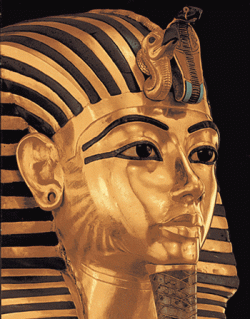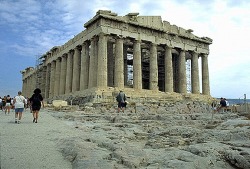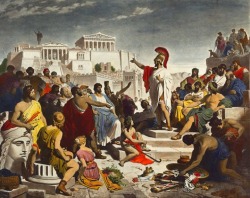Theocracy

http://www.hccsc.k12.in.us/riverview/Science%20Web/images/king_tut.gif
A theocracy is similar to a monarchy; however, in a theocracy, the king believes that he is a descendant of god. Hence, it gave them the name of a priest king. It is known that the divine kingship began as a rumor that the king started. This rumor was about a dream the king had incontrol over all of his subjects, and which the gods spoke to him telling him that he was their representative on Earth. There was also another theory about how a theocracy began in Ancient Egypt. This theory was when the king returned home from a long trip, he found his wife pregnant. She said that a god impregnated her because he wanted a long line of divine kingship.
A theocracy consists of a pharaoh; pharaohs had complete people considered him to be a living god. Historians are not positive who the first king was; however, some historians believe that it was Aha, but there are some who believe that it was Menes. Moreover, the youngest pharaoh ever was King Tutankhamen (pictured above). He became king at the early age of nine years old. As such a young ruler, he decided to demolish the Amama religion (when one believes in one god) because many of his subjects did not agree with the religion's practices. Another very powerful pharaoh of Egypt was Rameses II. He was considered to be the most powerful and most influential pharaoh of Egypt. He constructed the Ramesseum which was a memorial temple.
A theocracy consists of a pharaoh; pharaohs had complete people considered him to be a living god. Historians are not positive who the first king was; however, some historians believe that it was Aha, but there are some who believe that it was Menes. Moreover, the youngest pharaoh ever was King Tutankhamen (pictured above). He became king at the early age of nine years old. As such a young ruler, he decided to demolish the Amama religion (when one believes in one god) because many of his subjects did not agree with the religion's practices. Another very powerful pharaoh of Egypt was Rameses II. He was considered to be the most powerful and most influential pharaoh of Egypt. He constructed the Ramesseum which was a memorial temple.
Democracy
Democracy began in Ancient Greece. One of the first reformers was Cleisthenes; he changed the Athenian government from an oligarchy to a democracy. Democracy in Athens occurred as a result of numerous reorganizations. The word "Democracy" derives from the Greek words "demo" and "kratos". "Demos" translates to "power" while "kratos" translates to "people". Hence, the word "democracy" literally means "the power of the people." In Athens, democracy meant that all male citizens over the age of twenty were able to participate in the government. Democracy in the polis encouraged all the Athenian citizens to take part in public activities. Democracy also broadened the Athenians' minds, as well as making them more culturally aware. In addition, people became smarter and more intellectual due to a democratic government.
Athens democracy was both a direct democracy and a representative democracy. A direct democracy is a government where the people vote to create their own laws, and a representative government is a government where people vote for their representatives. These representatives then make laws that govern their society. Therefore, they had a lottery in which all of the citizens (excluding women, children, and slaves) were in. In this lottery, they chose five hundred people to serve in the government for one full year, and they had to serve as Athens’ law makers. When these people created laws, ALL of the citizens (once again excluding women, children, and slaves) were forced to vote on the newly formed laws. Although Greece's democracy was much different than our modern day government, it was definitely influenced our U.S. democratic government.
Athens democracy was both a direct democracy and a representative democracy. A direct democracy is a government where the people vote to create their own laws, and a representative government is a government where people vote for their representatives. These representatives then make laws that govern their society. Therefore, they had a lottery in which all of the citizens (excluding women, children, and slaves) were in. In this lottery, they chose five hundred people to serve in the government for one full year, and they had to serve as Athens’ law makers. When these people created laws, ALL of the citizens (once again excluding women, children, and slaves) were forced to vote on the newly formed laws. Although Greece's democracy was much different than our modern day government, it was definitely influenced our U.S. democratic government.
"One man, one vote, majority ruled." - Anonymous
"It is true that we (Athenians) are called a democracy, for the administration is in the hands of the many and not the few, with equal justice to all alike in their private disputes." - Pericles


